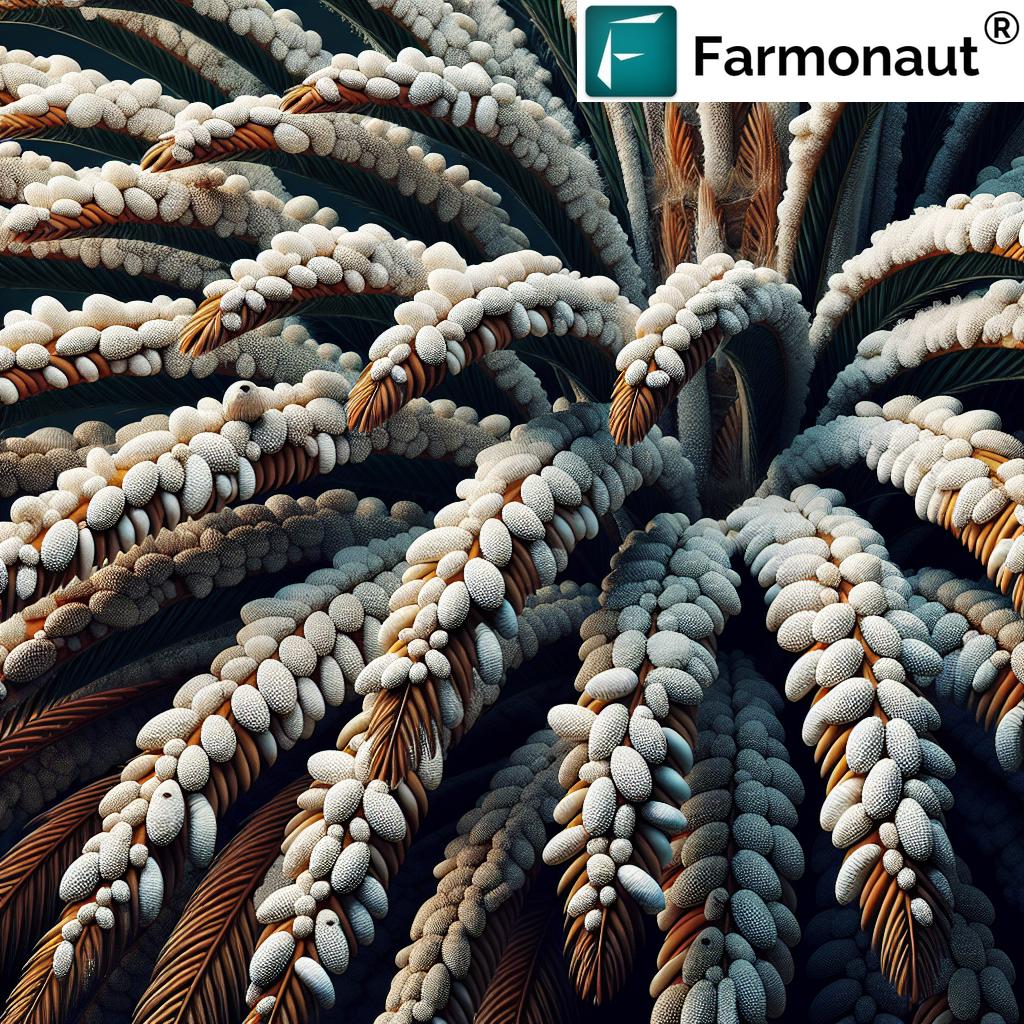Organic Pest Control for Date Palms: Effective Monitoring and Treatment Methods

Date palms are a treasured crop in many parts of the world, valued for their sweet fruits and cultural significance. However, like any cultivated plant, they are susceptible to various pests that can significantly impact yield and quality. In this comprehensive guide, we’ll explore effective organic pest control methods for date palms, emphasizing the importance of monitoring and early intervention. We’ll also discuss how modern technology, such as satellite-based monitoring systems, can revolutionize pest management in date palm plantations.
Understanding Date Palm Pests
Before delving into control methods, it’s crucial to understand the common pests that affect date palms. Some of the most problematic insects include:
- Red Palm Weevil (Rhynchophorus ferrugineus)
- Date Palm Dust Mite (Oligonychus afrasiaticus)
- Lesser Date Moth (Batrachedra amydraula)
- White Scale (Parlatoria blanchardi)
- Dubas Bug (Ommatissus lybicus)
Each of these pests has unique characteristics and feeding habits, making targeted control strategies necessary. For instance, the white scale insect, Parlatoria blanchardi, forms colonies on fronds and leaves, sucking sap and weakening the palm.
The Importance of Early Detection and Monitoring
Early detection is key to effective pest control in date palm plantations. Traditional monitoring methods often involve visual inspections, which can be time-consuming and may miss early signs of infestation. This is where advanced technology comes into play.
Satellite-Based Monitoring: A Game-Changer in Pest Control
At Farmonaut, we’ve developed a cutting-edge satellite-based monitoring system that revolutionizes pest detection in date palm plantations. Our technology allows for large-scale, frequent, and accurate monitoring of crop health, which can indicate pest presence long before visible symptoms appear.
| Feature | Traditional Pest Monitoring | Farmonaut Satellite Monitoring |
|---|---|---|
| Accuracy | Moderate (depends on inspector’s skill) | High (uses multispectral imaging) |
| Coverage Area | Limited (manual inspection) | Extensive (entire plantation at once) |
| Frequency | Low (time-consuming) | High (regular satellite passes) |
| Labor Requirements | High | Low |
| Early Detection Capabilities | Limited (visible symptoms only) | Advanced (detects stress before visible symptoms) |
To learn more about our satellite monitoring services, visit Farmonaut’s app.
Organic Pest Control Strategies for Date Palms
Once pests are detected, implementing effective control measures is crucial. Here are some organic strategies that can help manage pest populations in date palm plantations:
1. Cultural Control Methods
- Proper Sanitation: Remove and destroy infested plant parts to prevent pest spread.
- Pruning: Regular pruning improves air circulation and reduces hiding spots for pests.
- Irrigation Management: Avoid over-watering, which can create favorable conditions for certain pests.
2. Biological Control
Introducing natural predators can be an effective way to control pest populations. For example:
- Predatory mites for controlling date palm dust mites
- Parasitic wasps for managing scale insects
- Entomopathogenic nematodes for red palm weevil control
3. Organic Pesticides
When necessary, certain organic products can be used for pest control:
- Neem oil: Effective against a wide range of insects
- Insecticidal soaps: Useful for soft-bodied insects like mites and scales
- Diatomaceous earth: Can deter crawling insects
These organic solutions are generally safer for the environment and beneficial insects compared to conventional chemical insecticides.
4. Pheromone Traps
Pheromone traps can be used to monitor and control certain pests, particularly the red palm weevil. These traps attract male insects, disrupting their mating cycle and reducing population growth.
Implementing an Integrated Pest Management (IPM) Approach
An effective pest management strategy for date palms should integrate various control methods. This approach, known as Integrated Pest Management (IPM), combines cultural, biological, and chemical control methods as needed, with a focus on minimizing environmental impact.
Steps in Implementing IPM for Date Palms:
- Monitor regularly using both traditional methods and advanced technologies like Farmonaut’s satellite monitoring.
- Identify pests accurately to determine the most effective control measures.
- Establish action thresholds to determine when intervention is necessary.
- Implement preventive measures such as proper sanitation and cultural practices.
- Use biological control agents when possible.
- Apply organic pesticides only when necessary and in a targeted manner.
- Continuously evaluate the effectiveness of the control measures and adjust as needed.
The Role of Technology in Modern Pest Management
At Farmonaut, we believe that technology plays a crucial role in advancing pest management practices. Our satellite-based monitoring system offers several advantages:
- Early Detection: Identify potential pest issues before they become visible to the naked eye.
- Large-Scale Monitoring: Cover vast areas of plantations efficiently.
- Data-Driven Decision Making: Use precise data to make informed pest management decisions.
- Resource Optimization: Target treatments to specific areas, reducing unnecessary pesticide use.
To explore how our technology can benefit your date palm plantation, check out our API services or download our app for Android or iOS.
Case Study: Implementing Organic Pest Control in a Date Palm Plantation
To illustrate the effectiveness of organic pest control methods combined with advanced monitoring, let’s consider a hypothetical case study:
A 100-hectare date palm plantation in the Middle East was experiencing recurring issues with red palm weevil and white scale infestations. The plantation manager decided to implement an organic pest control program using Farmonaut’s satellite monitoring system.
Steps Taken:
- Implemented regular satellite monitoring using Farmonaut’s system.
- Established a rigorous sanitation program, removing and destroying infested plant material.
- Introduced predatory mites to control dust mites and parasitic wasps for scale insects.
- Set up pheromone traps for red palm weevil monitoring and control.
- Used neem oil treatments when pest populations exceeded established thresholds.
Results:
- Early detection of pest hotspots allowed for targeted interventions.
- Pest populations were significantly reduced within one growing season.
- Pesticide use was reduced by 60% compared to previous years.
- Crop yield increased by 15% due to improved plant health.
- Beneficial insect populations increased, contributing to long-term pest suppression.
This case study demonstrates how combining organic control methods with advanced monitoring can lead to successful pest management in date palm plantations.

The Future of Pest Management in Date Palm Cultivation
As we look to the future, several trends are shaping the landscape of pest management in date palm cultivation:
1. Precision Agriculture
The use of technologies like satellite imaging, drones, and IoT sensors will continue to grow, allowing for more precise and timely pest management interventions.
2. Artificial Intelligence and Machine Learning
AI algorithms will increasingly be used to analyze pest patterns, predict outbreaks, and optimize control strategies. At Farmonaut, we’re at the forefront of this technology, continuously improving our pest detection algorithms.
3. Biopesticides and Natural Products
Research into new, environmentally friendly pest control products will likely yield more effective organic solutions for date palm pests.
4. Climate Change Adaptation
As climate patterns shift, pest behaviors and distributions may change. Adaptive management strategies will be crucial, and data-driven approaches like those offered by Farmonaut will be invaluable.
Conclusion
Effective pest management in date palm cultivation requires a multifaceted approach that combines traditional wisdom with modern technology. By embracing organic control methods and leveraging advanced monitoring systems like those offered by Farmonaut, date palm growers can protect their crops while minimizing environmental impact.
Remember, successful pest management is an ongoing process that requires vigilance, adaptability, and a commitment to sustainable practices. By staying informed about the latest developments in pest control and utilizing cutting-edge technologies, we can ensure the health and productivity of date palm plantations for generations to come.
For more information on how Farmonaut can help you implement effective pest management strategies in your date palm plantation, visit our developer documentation or contact our team of experts.
FAQs
-
Q: What are the most common pests affecting date palms?
A: The most common pests include red palm weevil, date palm dust mite, lesser date moth, white scale, and dubas bug. -
Q: How can I detect pest infestations early in my date palm plantation?
A: Early detection can be achieved through regular visual inspections and by using advanced technologies like Farmonaut’s satellite monitoring system, which can detect stress in plants before visible symptoms appear. -
Q: Are organic pest control methods effective for date palms?
A: Yes, organic methods can be highly effective when used as part of an integrated pest management approach. These include cultural practices, biological control agents, and organic pesticides. -
Q: How does satellite monitoring help in pest management?
A: Satellite monitoring provides large-scale, frequent, and accurate data on crop health, allowing for early detection of pest issues and more targeted interventions. -
Q: What are some organic pesticides safe for use on date palms?
A: Safe organic pesticides include neem oil, insecticidal soaps, and diatomaceous earth. Always follow label instructions and local regulations when applying any pesticide.